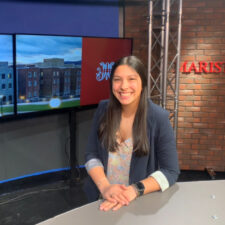Women only make up 28% of the STEM workforce, but why? Society’s standard allows the male-dominated field to discourage women from pursuing related careers in college. Women are then at a disadvantage because they are excluded from the fastest-growing and highest-paid professions of the future. Fortunately, passionate women continue to break gender norms by studying intensive STEM-related majors.
Emilia Winquist,’24, is studying mathematics with a pure concentration while minoring in German and music at the University of Vermont. At school, she is a member of various music ensembles but is hoping to get more involved with UVM’s Women in STEM Club as well as the Math Club.
In an interview with Winquist, she explained her passion for math and the importance of making STEM less intimidating for women.
***
What inspired you to study mathematics?
Emilia Winquist: I always liked math in school. Beyond just doing problems, I found the mechanics of how formulas and math work super interesting. It’s always difficult to know what you’re getting into with a degree in math. You have to get through some basic classes before it starts to get theoretical, but that theoretical math is what I really wanted to understand at some point. I also figured I would have more flexibility in careers in the future – from computer science to finance, I’d have the space to explore and pursue various fields.
What has been your most challenging class so far? The easiest?
Emilia: My easiest class was Fundamentals of Mathematics, which was the basics of proof-writing and math concepts you’d need for later courses. The hardest was Linear Algebra, although I suspect that will quickly be replaced this semester by Abstract Algebra or Ordinary Differential Equations. I had the most fun taking Intro to Combinatorial Theory, which was hard but felt like constantly solving puzzles and was super rewarding.
Why do you think it is important for people to study STEM in K-12?
Emilia: Partly, I think it’s important for people to be able to think somewhat analytically and learn some of the problem-solving skills that STEM teaches you. But also, science and math, especially statistics, are so important to understanding the world today. Even just regarding the pandemic, most of the information we received about COVID was in terms of numbers. Properly understanding things like that is vital!
Why do you think women are less likely to choose a STEM career?
Emilia: It’s intimidating! I’m in classes where the majority of the people are men. And, I have heard some talk avoiding certain professors or advisors as a woman because they’re a bit sexist. That aside, I’ve taken classes with some amazing female professors and have yet to have a truly negative experience with a male professor or classmate. If you look for good people and try to connect with professors, it’s definitely possible to find a support system that makes it less scary.
With that, what do you think would help encourage women to choose STEM majors if that is what they want to do? How do we close the STEM gap?
Emilia: I cannot overemphasize how impactful it has been to me to have female teachers in STEM classes in K-12, even more in college. It makes the world of a difference when the professor is female, even if the class itself has a male majority.
To wrap up, if you could tell your younger self one piece of advice, what would it be?
Emilia : Not worry about having a concept click first try. I used to freak out when I couldn’t figure out a problem after an hour. I’ve come to the point where I’ve mulled over a proof for an entire weekend, and then suddenly, walking out of a music rehearsal, it just makes sense to me.
***
Winquist plans on taking more compelling courses and has an interest in attending graduate school abroad. Though her long-term goals are less exact, she knows that she would like to complete an honors thesis before graduating with her Bachelor’s. She believes that anyone can study a path in STEM, as long as they enjoy what they are doing.
“Trust your own brain to understand it eventually.” – Emilia Winquist
 London Brazal is a Community Engagement and Marketing Intern at the Connecticut Science Center. She is a rising senior at Marist College working towards a Bachelor of Arts in Communications and Public Relations.
London Brazal is a Community Engagement and Marketing Intern at the Connecticut Science Center. She is a rising senior at Marist College working towards a Bachelor of Arts in Communications and Public Relations.



